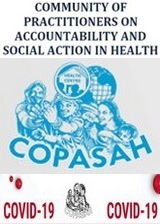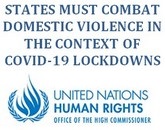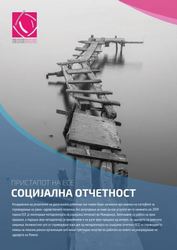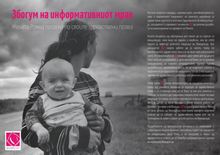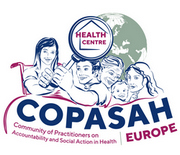Citizens’ participation enables development of budgets and policies that are based on the population’s actual needs, and guarantees adequate implementation thereof. By involving citizens in these processes, in particular marginalized population groups, the state would be able to deliver its commitment under the UN Sustainable Development Goals whereby “no one should be left behind” in exercise of citizens’ social and economic rights.
ABOUT THE ISSUE
The state does not have in place a legitimate, non-selective and continuous process for citizens’ involvement and participation in operation of central and local authorities. As a result thereof, citizens are not involved in processes on planning, implementation and monitoring of policies and budgets related to exercise of their social and economic rights. On the other hand, citizens lack knowledge about policy making and budgeting, as well as processes on monitoring their implementation both at national and local level. Moreover, citizens are not aware of their right to participate in these processes.
Due to such state-of-affairs, policies and budgets adopted by the state are not geared towards addressing citizens’ priority problems; they are not progressive and developmental; they do not comply with the principle of non-discrimination; and do not ensure equal access for different population groups. Allocation of budget funds across different sectors is not driven by needs and priorities; instead it is based on previously developed calculation formulas.
ACCESS TO HEALTHCARE
The above elaborated state-of-affairs has a direct negative effect on the exercise of the right to health, especially for vulnerable population groups. In continuity, the Ministry of Health has underperformed in terms of implementation of specific policies aimed to promote health of mothers and children, reproductive health of women and health of Roma people (including programs of the Ministry of Health such as Program for Active Health Protection of Mothers and Children, Program for Systemic Check-Ups of Pupils and Students, Program for Early Detection of Malignant Diseases, and the National Action Plan on Roma Health). Reasons for this situation include the fact that the national budget does not allocate sufficient funds for implementation of these policies, while budget allocations are not implemented in their entirety. The best illustration thereof is the fact that budget allocations for preventive healthcare account for the smallest share under the national budget, but also under the Ministry of Health’s budget. More specifically, in the period 2011-2015, the budget for preventive healthcare accounted for only 0.003% of the national budget and only 10.6% of the Ministry of Health’s budget.
In addition, the public health system responsible for implementation of these policies is characterized by lack of human and technical capacity. This situation is evident in terms of medical staff in primary healthcare, and concerns lack of gynaecologists, paediatricians, outreach nurses and personnel for preventive healthcare teams at healthcare centres. At the same time, the Ministry of Health does not dispose with mechanisms to monitor and evaluate implementation of preventive healthcare programs, and therefore heavily relies on reports submitted by program implementers, without involving citizens in this process as beneficiaries of these programs.
All these problems and shortfalls lead to inadequate healthcare coverage of vulnerable population groups, which had been duly noted in work performed by Association ESE in the last nine years. Namely, in the last 13 years the National Action Plan on Roma Health has been marked by low level of implementation. Activities targeting Roma communities that were adopted under the 2011 Program for Active Health Protection of Mothers and Children have not been adequately implemented, i.e. hardly reached their intended beneficiaries - Roma. In the course of years, these activities were reduced both in terms of type and coverage, and were completely deleted from the 2015 program. In its 2018 program, the Ministry of Health again adopted activities targeting Roma and implementation thereof is subject of monitoring conducted by ESE.
Women have not been visited by outreach nurses during their pregnancy, while their coverage after childbirth with outreach visits is inadequate and majority of women are visited one or two times, instead of the anticipated five visits. This situation is more worrying in Roma communities, especially in the Municipality of Shuto Orizari where, after childbirth, almost half of Roma women have not been visited at all by outreach nurses. Moreover, women that live in the most marginalized neighbourhoods across the municipality are the most affected.
As regards the Program for Cervical Cancer Screening, ESE’s monitoring efforts have observed a series of inconsistencies in planning and implementation of activities anticipated under this program. Hence, at national level, in the period until 2016 only 20% of the program’s target group, i.e. women aged 24 to 60 years, were covered with these screenings.
All of this has a direct negative effect on the population’s health outcomes, especially among vulnerable groups of citizens such as Roma. More specifically, Roma people in the Republic of Macedonia have a shorter life expectancy compared to the general population. This was confirmed by the fact that 50% of Roma die before the age of 65 years, while the national rate stands at 24%. The infant mortality rate in the Republic of Macedonia has increased in the last years and in 2016 it accounted for 11.9 deaths to 1000 live births, which is three times higher than relevant mortality rates in EU member-states. In 2017, the infant mortality rate in Macedonia dropped to 9.2 deaths to 1000 live births, but is still significantly higher than the EU average. Moreover, the mortality rate due to cervical cancer has also increased in the last several years.
As regards exercise of the right to social protection, Association ESE started activities to identify problems faced by people and households that provide homecare for seriously ill persons. First, public health facilities are marked by insufficient capacity for long-term accommodation and care for persons that are unable to care for their health. In particular, at national level, public health facilities dispose with only ca. 390 beds for accommodation of these persons, most of which are located in Skopje. On the other hand, state-reimbursed allowance for homecare of persons that are unable to care for their health is very low in amount (around 4,000 MKD). Association ESE’s initial findings showed that this amount is sufficient to cover the basic needs related to purchase of medicines and medical supplies for these persons, but is insufficient to cover caregiver-related costs. Hence, homecare is often provided by family members, which seriously affects a broad spectrum of daily life aspects for caregivers, including possibilities to work, care for their children, social life activities, etc.
ACCESS TO LABOUR MARKET
The situation related to the right to employment is identical to state-of-affairs observed in other public sectors. In particular, there is very low, or even non-existing, culture for citizens’ participation in processes on employment policy making and implementation, which is mainly due to lack of knowledge and skills, especially among women. Lack of knowledge or skills prevents citizens to assume their role in society and have their voice heard by decision-makers which, under such circumstances, are put in more advantageous position. One of the key problems in local communities, but also in the country, is the issue of high unemployment. Denied exercise of one of the fundamental human rights, i.e. the right to work, leads to deteriorated living standards and threatens the exercise of other fundamental human rights. Employment policies do not have gender perspective, which is a result of the lack of gender-sensitive policies. Violation of the right to employment, unequal access to the labour market for men and women, lack of gender-sensitive policies, lack of policies that reflect citizen’s actual needs, inefficient use of budget funds, inefficient planning of active employment measures and policies are just some of the key characteristics of the state-operated employment system in the Republic of Macedonia.
In the Republic of Macedonia, public institutions responsible for planning and implementation of employment measures and policies are characterized by high level of closeness and non-transparency in their operation. Due to opaqueness of public institutions and non-transparent processes on planning and implementation, current employment measures and policies do not reflect the actual needs and interest of citizens, especially not the needs and interests of women. In addition, there is no general culture for active civic engagement (which means that citizens are active and participate in policy and decision making processes from start to end), which is mainly a result of non-functional mechanisms for citizens’ involvement and participation and absence of practices for mobilization and empowerment of greater number of citizens that would later independently join these processes.
Results from the field survey research and analysis of data obtained from the Employment Agency of the Republic of Macedonia (EARM) under the instrument for free access to public information indicate to: high rate of long-term unemployment among citizens (63% of surveyed unemployed citizens have been unemployed for more than four years); very limited access to employment measures, programs and services for citizens on the account of their failure to register in records kept by EARM (46% of 826 surveyed unemployed persons are not registered and majority of them have not been registered for more than two years); only 25% of unemployed citizens are aware of their right to access employment measures, programs and services defined under the Operational Plan on Active Employment Measures and Labour Market Services; and only 6% of total number of surveyed citizens have found employment as a result of benefiting from measures, programs and services provided by EARM. In addition, EARM and other public institutions responsible for implementation of employment and affirmative measures do not have detailed data on the scope of implementation of these measures and the manner in which budget funds are spent; employment measures are heavily dependent on foreign donors and creditors (UNDP, EU and World Bank); most decisions on the manner in which affirmative measures are implemented are adopted by UNDP, whereby national institutions serve only as mediator; EARM transfers state budget funds to UNDP for implementation of active employment measures and does not keep records on the manner in which these funds are further spent in this process and does not have access to this type of data, etc.
WHAT WE DO ABOUT THIS ISSUE
We work on capacity building for civil society organizations to implement the social accountability methodologies, in order to involve citizens in processes on planning, implementation and evaluation of policies and budgets. Having recognized the need for citizens’ participation in these processes, in 2011 Association ESE started to implement the social accountability methodologies. Under these methodologies, citizens are informed about their rights and entitlements, they are empowered to actively participate in these processes, and public awareness is raised about the need for citizens’ involvement and participation. Association ESE implements this methodology in the field of access to preventive healthcare for mothers and children and for women in reproductive period, as well as in the field of access to active employment measures, programs and services. Implementation of the social accountability methodologies is especially important for members of vulnerable population groups, which have the greatest need of healthcare and employment but lack information about their rights and entitlements. Starting in 2016, Association ESE implements an integrated approach (social accountability and legal empowerment) in Roma communities. For that purpose, we work on continuous capacity building of eight civil society organizations (four CSOs profiled in promotion of women rights, one youth organization and three local Roma CSOs), by developing work methodology, delivering continuous training and providing direct technical assistance for their daily operation. In doing so, we help civil society organizations to familiarize citizens from municipalities where they are active with their rights and entitlements related to preventive healthcare for mothers and children, women reproductive health and employment; assess state-of-affairs in terms of coverage of Roma with these service and quality of services provided to this population, by means of community active participation and involvement; empower local population to make proactive demands related to the exercise of their rights in the field of preventive healthcare and employment; and empower local population for active involvement in advocacy aimed to promote the scope and quality of preventive healthcare and active employment measures. In this field, Association ESE works in partnership with three Roma CSOs (IRIZ, KHAM and Romano Chachipe). In addition to this cooperation, we also deliver training and provide technical assistance to other CSOs interested to implement the social accountability methodologies, both from Macedonia and from the regions of Southeast and Central Europe.
We work on capacity building of public institutions for involvement of citizens and civil society organizations in development, implementation and monitoring of legal regulations, budgets and services. In that regard, in the last years we have closely cooperated with the Ministry of Health in order to introduce the social accountability methodologies in the process on monitoring and evaluation of the ministry’s preventive healthcare programs. As part of these methodologies, for the first time the Ministry of Health will have the opportunity to obtain direct information from citizens as end-beneficiaries of these programs concerning quality of services they receive, barriers they are facing, and proposals aimed to improve the programs. For that purpose, we plan to deliver training for ministry representatives on implementation of the social accountability methodologies and assist the ministry in implementation thereof. In addition, Association ESE’s representatives participate in relevant initiatives and work groups at the Ministry of Health, where they are able to present positions and demands based on findings from ESE’s work with citizens and partner organizations.
We work on promotion of health and access to healthcare services for mothers and children, as well as for women in reproductive period. Hence, since 2011 Association ESE has conducted regular monitoring of planning and implementation of activities and budgets intended for preventive healthcare services for mothers and children, and preventive healthcare services for women reproductive health. Subject of monitoring are preventive healthcare programs of the Ministry of Health, including the Program for Active Health Protection of Mothers and Children, Program for Systemic Check-Ups of Pupils and Students, Program for Cervical Cancer Screening, and Program on Participation Fees for Healthcare Services. In the last years, we have expanded monitoring efforts to cover all healthcare services for these population groups stipulated in other legal regulations, not only preventive healthcare programs of the Ministry of Health. Continuous monitoring has allowed identification of inconsistencies and problems in the process on planning and implementation of preventive healthcare programs. Identified problems and shortfalls are directly mirrored in insufficient coverage of vulnerable population groups with preventive healthcare and quality of services provided. Monitoring findings are used for development of recommendations aimed to promote the process on planning and implementation of healthcare services and budgets. Findings and recommendations are used as baseline for advocacy before relevant institutions, in order to improve health of mothers and children and reproductive health of women.
Having in mind the trend on increasing infant mortality in the Republic of Macedonia over the last 10 years, from 2015 Association ESE has focused its work on identification of reasons behind that situation. Hence, we developed an initial analysis of state-of-affairs on the basis of publicly available data. In addition to increased mortality rate, the analysis showed another problem related to lack of publicly available data that would allow establishment of reasons behind this trend. Faced with this fact, in 2017 Association ESE formed a work group comprised of relevant experts in this field. This work group strives to establish reasons that have led to current state-of-affairs and use them as baseline to develop recommendations for state institutions, with a view to reduce the infant mortality rate.
We work on promotion of health and access to healthcare services for Roma people. In partnership with three Roma CSOs, ESE works on determining health needs of Roma people, including barriers they are facing in terms of access to healthcare services. Our work puts a special emphasis on healthcare services for mothers and children in Roma communities, as well as reproductive healthcare services for Roma women. ESE’s monitoring of the Ministry of Health’s preventive healthcare programs pays special attention to activities anticipated under these programs targeting Roma and activities of special interest for Roma communities. Furthermore, monitoring findings are combined with findings from community monitoring performed by Roma in order to identify problems they are facing in terms of coverage and quality of preventive healthcare services. These findings serve as baseline for development of recommendations aimed to promote coverage and quality of preventive healthcare services intended for Roma population and for advocacy before competent public institutions. Development of recommendations and advocacy actions are pursued in cooperation with three partner Roma CSOs and Roma community members.
Association ESE’s work on detecting reasons behind increased infant mortality rate in the Republic of Macedonia puts special focus on reasons behind increased infant mortality among Roma people. This is especially important in the light of the fact that infant mortality among Roma is 1.5 times higher compared to infant mortality among the general population. This analysis would provide insights into specific needs and urgency for implementation of specific activities targeting Roma people and aimed at reducing infant mortality.
Our work on promotion of health and access to healthcare services, as well as exerted influence and impact, is documented in a series of articles that are made publicly available. These articles can be used by all stakeholders that work on promotion of Roma health.
We work on improving access to the labour market for women. In 2017, Association ESE has started work on capacity building and partnership work with five CSOs for regular monitoring of planning and implementation of activities and budgets intended for implementation of active employment measures, programs and services anticipated under EARM’s Operational Plans. Subject of monitoring are three components from the Operational Plans on Active Employment Measures and Labour Market Services, as follows: self-employment program, program on subsidized employment titled “Macedonia Employs” and services offered by EARM. ESE’s continuous monitoring has resulted in identification of inconsistencies and problems in processes on planning and implementation of active employment measures, programs and services. Identified problems and shortfalls are directly mirrored in limited access for citizens, especially women, to active employment measures, programs and services; insufficient information about these measures, programs and services; low quality of implementation and low use of existing programs, measures and services. Monitoring findings are used for development of recommendations aimed to promote the process on planning and implementation of active employment measures, programs and services. Moreover, findings and recommendations are used for advocacy before competent institutions in order to promote access for citizens, especially women, to employment programs, measures and services.
We work on providing systemic solutions to improve the status of seriously ill people that need long-term homecare and of their caregivers. In that regard, ESE conducted a national survey research to establish actual needs of people necessitating homecare provided by caregivers. The research also inquired about effects on caregivers from provision of homecare, as well as effects on the whole family. Findings will be shared with the broader public, followed by advocacy to improve the status of persons that need homecare, as well as the status of families that provide homecare.




